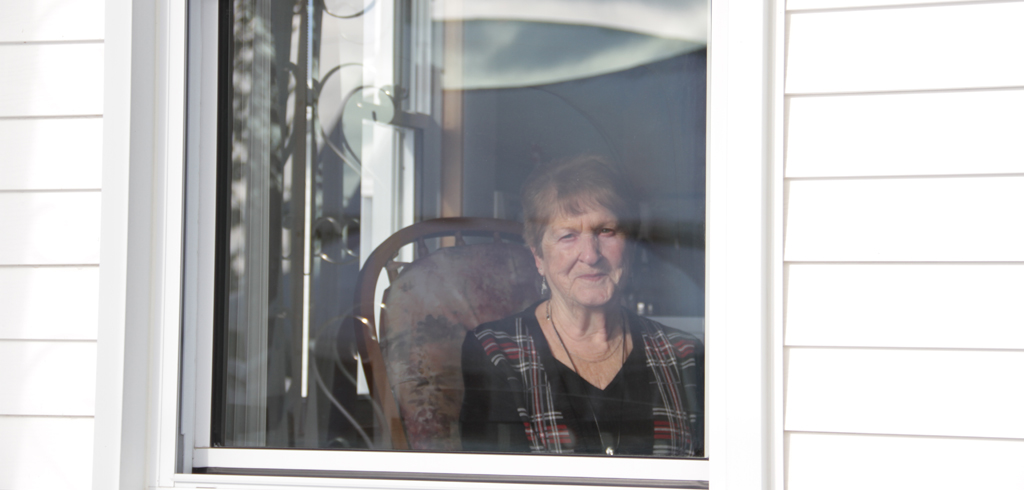Rose-Aline Lebrun
The community has created a strong support network to ensure the well-being of seniors living alone at home in the Haut-Saint-François. Despite confinement, they find themselves well surrounded, reducing loneliness and psychological distress.
With 130 volunteers for some 800 beneficiaries, the Haut-Saint-François Volunteer Action Center (CAB du HSF) offers support and mutual aid service to elderly persons in the MRC. «People have created a network and good support among themselves in the community,» explained Johanna Dumont, coordinator of home-support volunteers at CAB. According to her, even neighbors who did not know each other began to grow closer together and to help one another. Despite several health difficulties encountered since the start of the pandemic, Florianne Magnan, an octogenarian in East Angus, claims to have enough contacts every day. “We are well surrounded, all the same,” she said. For Rose-Aline Lebrun, of St-Gérard, the situation does not bother her very much because she feels well, and peaceful at home. The 87-year-old still receives occasional visits from her children, one at a time as requested by the government, and makes phone calls to combat the solitude.
Ms. Dumont explained that the second wave has revealed much less depression among seniors than during the first. According to her, people have much more resilience and hope in relation to science and the vaccine. “For me, it hasn’t changed much. I put it in the hands of God, and I take care too, ”explained Ms. Lebrun, whose religion is a great help to get through this period. Ms. Magnan is in a fairly difficult situation: She has to take care of her husband who is awaiting an operation, as well as her sister who has a handicap and is currently in a CHSLD. «It’s sad because it’s like we’re living through a war inside of us,» she said with emotion. The coronavirus worries her, especially because of her fragile health. «I can’t wait for the vaccine to help reassure us,» she said.
To fill their days, seniors sometimes need to be imaginative. While some have been able to continue their usual routine, others like Mrs. Magnan and her husband, who had an active social life, found themselves destabilized. She who took part in various committees, went dancing on a regular basis and ate in restaurants up to three times a week, had difficulty adjusting to this new sedentary lifestyle. “I take my walks every day, at least half an hour. It’s very important, and it helps my morale,” she said. For Ms. Lebrun, it is her freedom that she misses. «I was going out to do my errands, shop a bit with my children. That’s what I like least, that we can’t go out,” she explained, adding that she can’t wait to regain her autonomy. Marcel Busque, East Angus citizen in his 70s and Meals on Wheels volunteer, doesn’t see much of a difference in his days. Busy with his deliveries, he occupies the rest of his time with working in his basement. He finds evenings difficult and longer, however, as he used to help his son by picking up his grandson from school in the evenings. «We are definitely going through difficult times, but if we try to follow the regulations, all together, we are going to come out of it,» said Ms. Lebrun, confident in the future.
Diane Grenier, CAB volunteer coordinator for the English-speaking community, said the situation is similar to that of French speakers. However, she feels a lot more fear among English speakers. As they are more reserved, they go out less, show their distress less and are less likely to seek the help they need, she said. If they have family and close friends, they are often less physically accessible because they do not live in the same town. With a ratio of approximately 30% English speakers to 70% French speakers, Ms. Grenier said that organizations take care to provide adequate service, regardless of language. This is why many volunteers at the CAB are bilingual.
Anyone who feels the need to talk can contact the CAB through its website at https://cabhsf.org/ or by phone at 819-560-8540.















